Blazing Combat
Editor and Writer: Archie Goodwin
Original Publisher: Warren Publishing (1965-66)
Re-published by Fantagraphics Books
Blazing Combat was a war anthology edited and written by Archie Goodwin in collaboration with a dozen artists. It was also a commercial flop back in the sixties, getting canceled after only four issues. According to its publisher, James Warren, the tepid sales were due to politics. The book earned the ire of comic distributors (many of whom were veterans) for its perceived anti-war bias and they refused to sell it. It was outright banned from stores on military bases, meaning that active servicemen (who made up a sizable share of the market for war comics) could not buy it.
But authoritarian politics and government censorship are no match for comic book nostalgia. Decades later, Blazing Combat was resurrected by Fantagraphics, and it’s not hard to see why. Forget the stories or the politics; the list of artists who worked on this title is an aging fanboy’s wet dream. Frank Frazetta (on covers), Wally Wood, John Severin, Alex Toth, Gene Colan. And these artists brought their “A” game. As mainstream comic art goes, few books look as good as Blazing Combat.
However, a reader can’t appreciate the art without eventually addressing the subject matter. Did this book deserve its reputation as an anti-war comic? To a limited degree, yes. The comic clearly did not fit the standard mold of the male adventure genre. There are no two-fisted heroes swaggering over a mountain of enemy corpses. Instead, most of the short stories commented on the brutality and absurdity of war.
One example is “Holding Action,” by Archie Goodwin and John Severin (panels from this story were used as the cover for the Blazing Combat trade paperback). Set in the last months of the Korean War, the plot depicts the psychological descent of a new recruit, Private Stewart, as he faces several terrifying raids by the Chinese.
By John Severin
I particularly like the transition of emotions across Private Stewart’s face. After several battles, Stewart becomes obsessed with being prepared for the next attack, to the point where he will no longer leave his trench, even after the ceasefire is formally declared.
The entire story is only seven pages long, and the characters are as thin as the paper they appear on. But the tale isn’t about the characters, it’s about a simple message: fear and violence breeds neurotic behavior. And it delivers this message without becoming preachy.
Arguably the most famous story in Blazing Combat, and the one that got it banned from military bases, was “Landscape,” by Archie Goodwin and Joe Orlando. The story chronicles the miseries that befall an aged rice farmer in rural Vietnam during the early 1960s. He’s an unassuming peasant who just wants to be left alone so that he and his family can tend their crops. But war comes to his village, first in the form of the Vietcong, who murder everyone connected to the South Vietnamese government.
By Joe Orlando
Then comes the U.S. Green Berets, sent to drive the Vietcong from the village. They kill the farmer’s son, who had enthusiastically, and foolishly, joined the rebels.
Then the Vietcong counterattack and destroy the village, and the farmer’s wife is killed. Left without a home or a family, the farmer becomes fixated on the only thing left to him – his rice paddy. But the South Vietnamese army comes to reclaim the village, and they burn the rice paddies with flamethrowers to kill the guerrillas who are hiding there. The old farmer attempts to stop them, but he is shot and killed in the crossfire.
It’s about as heavy-handed a tale as one can imagine. But there’s an element of truth there: 20th century wars inflicted their heaviest casualties on civilians rather than combatants. And wars rarely seem glorious or exciting to the unarmed masses caught in the middle.
Blazing Combat can be described as an anti-war comic, but only to a limited extent. Whatever Archie Goodwin’s feelings on the matter, war is the selling point of this comic. After all, the title is BLAZING Combat, not Oh, The Humanity Combat. And each issue has a Combat Quiz, which tests and rewards the readers’ knowledge of useless military trivia. And the covers were drawn by Frank Frazetta, who apparently did not get the memo that war isn’t cool.
By Frank Frazetta
What was that I said about two-fisted heroes on a mountain of corpses?
Francois Truffaut once declared that there was no such thing as an anti-war film. His point was that, regardless of the filmmakers’ intent, war films glamorized combat because violence is inherently exciting. This contradiction is evident in quite a few of the stories in Blazing Combat, particularly “Lone Hawk,” by Archie Goodwin and Alex Toth. The story is a short biography of Billy Bishop, a Canadian fighter ace from World War I.
By Alex Toth (who also did the lovely lettering)
The biography lists Bishop’s many victories in battle, but juxtaposed to those accomplishments are the deaths of other famous fighter aces, including Albert Ball and Baron von Richthofen. The bio ends by noting that the most unique aspect of Bishop’s career wasn’t the number of planes he shot down, but that he survived the war, unlike so many of his peers. There is a clear anti-war message in emphasizing the high casualty rates of fighter pilots. And yet the message is hard to care about when Toth’s art is constantly glorifying the excitement and danger of aerial combat.
And on the very first page, Goodwin begins the comic with this overripe narration: “The skies of Europe are Valhalla for the heroes who are dying in flames only to be replaced by new champions – aces all…” Thor couldn’t have said it better himself.
But even when the stories avoid glamorizing combat, they are still problematic. As I mentioned above, war is the selling point. Even if readers, writers, and artists all considered themselves to be anti-war politically, they’re interested in war as a subject, and they presumably still want to be entertained by their comics. Even a story as ardently anti-war as “Landscape” relies on conflict for meaning and relevance. The reader can wallow in the tragedy, the pointlessness, the evil. They pat themselves on the back when their political values are affirmed, and they shake their head knowingly at man’s inhumanity. But anti-war stories are still just stories, and like all stories based on real events, they have a tendency to turn other people’s tragedy into our entertainment.

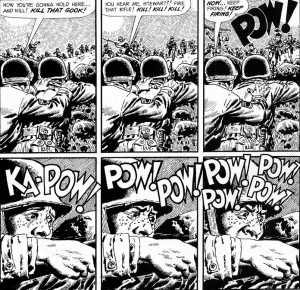
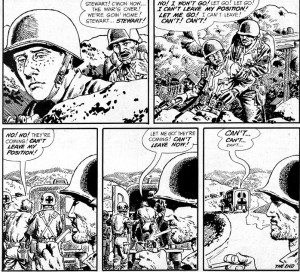
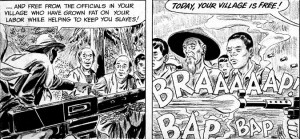
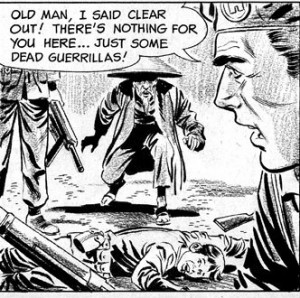
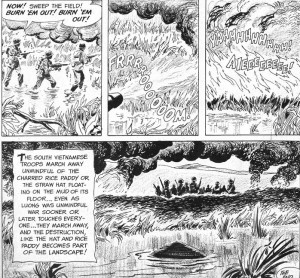
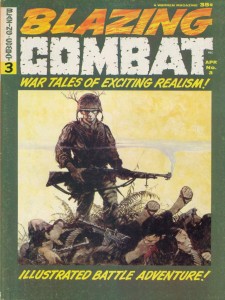
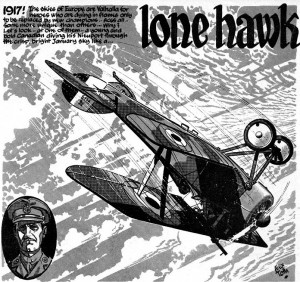
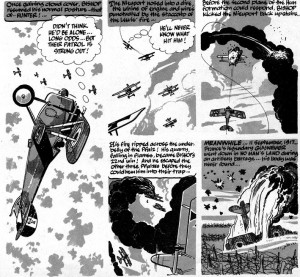
Absolutely nothin’! Say it again! Huh!
Whew, man, I’m prepping a post on Blazing Combat too. But that’s very cool, I like it when there are many eyeballs on a subject.
Russ Maheras– are you ready to proceed, as we agreed?
Hey Alex, I look forward to your post. I’m sure it will be far more comprehensive than mine.
I had never heard of this series until I did maybe 20 minutes worth of text-scanning for the project while interning at FB a couple of summers ago. The re-release looks gorgeous and I can’t wait to dive into it!
Wait…you interned at fantagraphics?
For a spell.
I think I disagree that it’s not possible to create anti-war stories. By that logic it would be impossible to create any art that is politically engaged, since representing the injustice (or whatever) automatically lends it legitimacy. You sort of end up in a place where you’re reduced to some sort of Puritan absolutism where the only way to deal with evil is to refuse to talk about it.
I think I’ve mentioned this before, but I think Tobias Wolff’s memoir is an effective anti-war book. Catch-22 as well (though I probably don’t like it as much.)
And actually I think that story about that Goodwin/Orlando story seems like maybe mediocre art, but probably anti-war mediocre art. From your plot description and the art provided, it’s hard to see how it glorifies war (though the other stories and art you point to seems to be much more ambivalent.)
I think your point may hold good for the kind of pulp milieu in which this existed. It’s hard to create consistently anti-war art when you’re trying to create a marketable commodity and the market is not especially interested in anti-war art.
Maybe that quote by Truffaut was meant to be more provocative than definitive, to act as a kind of cautionary statement for film makers. It’s not particularly useful as a dictum when it comes to war-related art. As you say, it would mean the inefficacy of “anti-anything”. There will always be people who will be moved to joy by evil (whether it’s rape, racism, genocide etc.).
Sure, Alex. I’m ready when you are.
I’ve always thought Truffaut’s point was that the excitement of filmed representations of war worked against any anti-war message, drawing you in psychologically and emotionally to the very thing that the anti-war message is trying to get you to dissociate yourself from. It’s a melodramatic phrasing, but the kernel of it is that violence is seductive.
I’m not familiar enough with Truffaut’s oeuvre to know: did he ever film any war scenes or even particularly graphic non-war violence?
It’s worth noting that he didn’t say anti-war “stories” — I think it’s vastly easier to downplay the excitement of violence in prose than it is in film. It’s the verisimilitude of the cinematic representation that introduces the problem…of course you could be very abstract, but Truffaut wasn’t all that keen on highly abstract cinema…
————————-
Richard Cook says:
And the covers were drawn by Frank Frazetta, who apparently did not get the memo that war isn’t cool.
————————-
They might not have been as heavily anti-war as the stories within. But, contrast the different treatments of “two-fisted heroes swaggering over a mountain of enemy corpses”:
https://hoodedutilitarian.com/wp-content/uploads/2011/02/Blazing_Combat_03_pg01.jpg
http://1.bp.blogspot.com/_41h1KEUny6U/TBu1_N_jC6I/AAAAAAAAA_s/asIlwPbv82M/s1600/FrankFrazetta-Conan-the-Adventurer-1966.jpg
The dead VC are particularly humanized – that sandaled foot a pitiful touch – at the forefront of the scene, in a way that Conan’s other heaps-o-victims are not. (Another example: http://1.bp.blogspot.com/_fvSSLy0eIhA/S8kXehZv_gI/AAAAAAAAAW4/FpzDoDCO2h4/s1600/Frazetta+Conan+the+Destroyer.jpg )
All Frazetta’s “Blazing Combat” covers can be seen at http://my.opera.com/billinbeijing/blog/frazetta-s-blazing-combat-covers-commen . Only the last can be seen as glamorizing war; in the first, a U.S. soldier is shown grievously wounded. While his comrade fires away into the fog, for all we know as effectively as that cannon in “Heart of Darkness” sending shell after shell into the impenetrable jungle. In the second, one of “our boys” is a grotesque, unheroic corpse in the foreground, his brains blown out.
“It’s worth noting that he didn’t say anti-war “stories” — I think it’s vastly easier to downplay the excitement of violence in prose than it is in film. It’s the verisimilitude of the cinematic representation that introduces the problem”
I think that’s probably right, and in this case I think comics (or at least a mainstream comic such as this) are closer to film than to prose.
Noah- I wouldn’t limit my last point to just pulpy comics (though it is likely more of an issue with commercial entertainment). I think it’s a common tendency for story-tellers to find drama in the suffering of others. And there is an exploitative aspect to this, regardless of the story-tellers’ politics. I don’t think that means telling an anti-war or anti-anything story is impossible, but themes and messages within the same story are often contradictory.
And there are ways to mitigate. Some artists are obviously more self-aware of their motives than others. And autobiography is less problematic: I’m not familiar with Tobias Wolff’s memoir, but I know that Catch-22 was partly autobiographical.
Mike- that’s a good defense of the Frazetta covers. But I’m not convinced that humanizing the Vietcong corpses prevents the glamorizing of violence. This may be a matter of idiosyncratic interpretation, so perhaps we should just agree to disagree.
The cover of _Blazing Combat_ # 1 by Frank Frazetta is a rip-off of a Giorgio De Gaspari cover for _War Picture Library_ # 13 (March, 1959). It was also swiped by Hugo Pratt (twice!).
By gum, right you are: http://2.bp.blogspot.com/_XbLgpv9SBYY/TVBrJhdDrNI/AAAAAAAAHdI/-I_WPii9uGA/s1600/WPL13.jpg (from http://cloud-109.blogspot.com/2011/02/rest-of-best-war-picture-library-1958.html )
Izzit possible to make anti-war comics that don’t still glamorize war? One Photoshopper’s humble suggestion: http://i1123.photobucket.com/albums/l542/Mike_59_Hunter/drearywar3b.jpg
On an exalted level, there’s Tardi’s “It Was the War of the Trenches”…
This old TCJ message board thread comprehensively dissected the whole run of “Blazing combat”:
http://archives.tcj.com/messboard/viewtopic.php?t=6001&highlight=&sid=3222144711f3fb606441c4e3277a0ca6
There, I mentioned:
———————
…Researching some images online, ran along this cover from the King, which reminded that Kurtzman did not invent the “non-gung-ho” approach to war comics (even if he might have perfected it):
http://kirbymuseum.org/blogs/simonandkirby/wp-content/uploads/2007/02/Foxhole1.jpg
More about “Foxhole Comics” from the fine folks at the great Kirby Museum:
http://kirbymuseum.org/blogs/simonandkirby/archives/681 ,
http://kirbymuseum.org/blogs/simonandkirby/archives/559 …
———————–
It’s true that Toth was overwhelmed by the glamour of aeronautical combat–Billy Bishop is exactly what you say. Still, the glamourization was present in the script Toth worked with, he is as usual extremely accurate in his drawings and the piece is one of his best-ever uses of duotone shading, rivalling the mastery of Roy Crane that will be seen in Fantagraphics’ upcoming collection of Buz Sawyer.
Caro – I’m not familiar enough with Truffaut’s oeuvre to know: did he ever film any war scenes or even particularly graphic non-war violence?
I don’t think so. I’ve seen most of his work except for two or three of them. The closest he got to war was “The Last Metro,” which was about a group of theater people living in occupied Paris.
Caro- I think it’s vastly easier to downplay the excitement of violence in prose than it is in film.
It’s vastly easier to downplay the excitement in comics than it is in film… witness “It was the War of the Trenches”
Here’s my review of the book for TCJ, published last March:
http://www.tcj.com/history/blazing-combat-review/
One thing I emphasized in my review, and it bears repeating here, is that the only known fact about the original magazine’s failure is that sales tanked with the second issue and never recovered. No one knows why it failed.
Warren’s claims about the American Legion and objections to the anti-war tone or the “Landscape” story are entirely speculation on his part. He states he has no concrete basis for those claims in the interview with Michael Catron that’s featured in the FB collection. No one told him anything.
As I wrote in my review, I think it is far more likely that distributors and vendors objected to the second issue’s horrifically violent cover illustration. I note here that when Catron republished the stories in a four-issue series back in the ’90s, the original cover paintings were used except the one for the second issue. He replaced it with a colored blow-up of an interior story panel. It was a prudent move; that cover was all but guaranteed to cause trouble, even in the ’90s.
James, I will bow to your unmatched Toth-knowledge.
Robert- that’s a interesting counterpoint. So is there any proof to the claim that the book got banned from military PXs? Would the military ban a comic for violence? I guess it was the sixties, but it seems almost perverse to “shield” soldiers from fantasy violence.
“I note here that when Catron republished the stories in a four-issue series back in the ’90s, the original cover paintings were used except the one for the second issue. He replaced it with a colored blow-up of an interior story panel. It was a prudent move; that cover was all but guaranteed to cause trouble, even in the ’90s.”
As advertised in Blazing Combat: World War I and World War II #2, the cover you refer to would have been the cover of issue #3. But that issue was never published.
I did not then and do not now think it would have caused trouble in the direct market.
Just so you know.
Mike–
Thanks for replying. However, your memory is playing tricks on you.
A check over at Lone Star Comics’ comprehensive back-issue ordering service shows there were actually two 2-issue series, one subtitled Vietnam & Korea, the other World War I & World War II. The four issues were published on a quarterly basis between August 1993 and June 1994, although there was a four-month gap between the second Vietnam & Korea issue and the first World War I & World War II issue.
All four were published. I purchased them when they came out, and Lone Star wouldn’t list them if they hadn’t been.
Here are the covers for the Vietnam & Korea issues:
http://www.mycomicshop.com/search?TID=119441
The first uses Frazetta’s painting for the Warren issue #3; the second uses the image for Warren’s #1.
These are the covers for the World War I & World War II issues:
http://www.mycomicshop.com/search?TID=119461
The first uses a colored panel from the Wallace Wood story “The Battle of Britain!” The second uses Frazetta’s painting for the fourth Warren issue.
Frazetta’s painting for the second Warren issue is the one you chose not to use in your reprinting. As can be seen here, it is a World War II image, so it would not have been out of place on your first World War issue.
Why did you choose to run a modified Wallace Wood panel instead of it?
Nor would it have been out of place on the third World War II issue. Where it would have been, had that issue ever seen print. Which it did not. Which is why Lonestar (and everybody else) does not list it. BC:WWI & WWII would have been the 5th issue (if you want to count it that way). As I said, the 3rd WWI & WWI issue was advertised. If you actually have the 2nd issue, you can look it up. So, no, my memory is not playing tricks on me. I have all four published issues sitting in front of me as I type this. I chose the Wood piece for the first issue because that’s the issue that story appeared in. I needed three covers for what would have been a 3-issue series. You could say I was saving the best for last.
To add my two-cents’-worth to speculation as to the commercial failure of “Blazing Combat,” though the drugstore in Miami where I got all my comics received and put out all the Warren mags (and other competitors like Skywald and Eerie Publications’ b&w horror mags) – and I religiously checked out the weekly offerings – “Blazing Combat” never showed up there…
Mike C.–
I don’t have the issues handy. I tossed them after getting my copy of the hardcover. So I’ll take you at your word.
Why didn’t you publish the issue after advertising it?
Richard–
There’s no evidence of an edict by the Department of Defense or anybody else down the chain of command that Blazing Combat was not to be offered for sale in PXs.
There’s also no evidence that it wasn’t offered for sale in PXs. Warren didn’t deal with retailers. He dealt with a national distributor who dealt with sub-distributors who supplied the magazines to the various stores, PX and otherwise. By his own account, he received no feedback about the magazine from his distributor or anyone else in the sales chain. All he knows are that sales tanked with the second issue and didn’t recover.
Everything else is Warren’s speculation about what happened. A less generous person might say it is his fantasy.
Also, PXs don’t just sell to military personnel. Their customers also include personnel families. They’re as much a “family store” as anything you’ll find in the private sector. If management felt a magazine was objectionable for kids, they’d be quite justified in not racking it.
No, PX’s are a quite separate and independent distribution system. Any publisher would immediately see if he was redlined by the PX network.
Russ, I sent you an email…did you get it? I ask because I “upgraded” to Yahoo beta, and my emails have dropped off since.
Gah!!! Noah– please scratch the above comment. Please use this instead:
Warren doesn’t actually say anything about the PXs in his interview with Catron. (Although, to be fair, Catron doesn’t specifically ask about them.)
The following are the passages from Catron’s interview where Warren specifically talks about the distribution problems. I’ve boldfaced where he makes it clear he’s just guessing about what happened at the distribution and retailer level.
And of course, that lead story [“Landscape,” in issue #2]–well, if you’re going to do something wrong, we did it wrong. “Wrong” being aggravate the kind of peoplewho can keep you alive or make you dead. Namely, the wholesalers.
So it’s very possible that they looked at that second issue and they didn’t just thumb through it, they looked at the first story and said, “Oh my God, these people are anti-American…”
[snip]
And the story I got back was that the American Legion, which was very much gung ho for Vietnam or any conflict involving American boys at that time, looked on us and saw us as traitors to our own country. And I think that happened with the second issue. The sales were terrible. They were terrible with the third and, of course, they were terrible with the fourth.
And no one would tell me the truth. Our national distributor didn’t care enough to delve into it. The people who were responsible for it didn’t have the courage to write me a letter, or telephone me, or tell me to my face at the conventions I attended–the distributing conventions or whatever–that I was un-American and that I was doing a shameful thing
Note that when Warren brings up the American Legion, he never says who told him they took a dim view of him or the magazine. And in the following paragraph, he admits that no one who might have had knowledge of the magazine’s distribution and sales problems told him anything whatsoever.
It’s pretty obvious from this that Warren doesn’t know why the loss of sales occurred. He’s just rationalizing it after the fact and throwing unsubstantiated allegations around.
But the back cover explicitly states that the book was banned from military post exchanges. So is that just speculation by Michael Catron?
No. It’s a tall tale that Warren’s repeatedly told elsewhere, and it’s assumed the status of an urban legend. The difference here, I believe, is that Catron is a fellow businessman, not a starry-eyed fan at a convention who’s looking to ooh and ahh over his fish stories. Warren appears to have taken this interview much more seriously than the others I’ve read with him; he’s far less fanciful than he comes across elsewhere.
Judging from the interview with Archie Goodwin, Warren told the PX story to Goodwin at some point. I think Goodwin was politely skeptical, though. Judge for yourself:
Well, my recollection [about the cancellation] is that in the second issue, Joe Orlando and I did this story called “Landscape” which is… about a Vietnamese farmer who is basically caught in the middle of the war. I guess when that issue came out, whoever reviews the books to approve them for distribution on military bases turned it down because the story made it look like–according to Warren’s version of what he was told–it made it look like U.S. soldiers were killing innocent civilians.
That “according to Warren’s version of what he was told” is pretty clear hedging about Warren’s veracity. And Warren makes it clear in his own interview that he wasn’t told anything.
Saying a publication was suppressed because of political content is a lot sexier than saying it was a commercial flop. It also makes for more effective advertising copy; people are naturally curious about something that’s been withheld from them. I think Catron actually believes it; the discordant notes in Warren and Goodwin’s testimony just don’t seem to have registered with him. If they had, he wouldn’t be including jacket copy or writing introductory material for the book and Warren’s interview that repeats this blarney.
Those “discordant notes” are mighty weak ones, though. I think you’re being a bit revisionist, here. Remember, in those days it took up to six months to get circulation figures– with the exception of sell-out hits (retailers and wholesalers demanding you go back-to-press) or exceptional disasters. Blazing Combat seems to fit the second case.
Alex–
I’m not saying the sales didn’t force the cancellation of the book. I’m saying there’s no basis for claiming it was suppressed at the distribution and retail levels because of its political content.
There is no evidence. Show me one bit of evidence. Anything.
It’s not up to me to prove Blazing Combat was suppressed because of its anti-war content. It’s up to Warren, Catron, et al. All you’ve got is Warren’s testimony, and it’s obvious he doesn’t know why the magazine failed; he’s just speculating as to what the reasons were, and those are self-aggrandizing. In his eyes, he’s not the publisher of a commercial flop; he’s a martyr to truth and political suppression. It’s bullshit.
The first two sentences of that last graf should read:
It’s not up to me to prove Blazing Combat wasn’t suppressed because of its anti-war content. It’s up to Warren, Catron, et al. to show that it was.
Noah says an edit fuction may be in the works. Let’s hope.
Well, no. Warren was an experienced and canny publisher who kept close contact with his distributors.
From ‘The Warren Companion’:
jon B Cooke: Did you receive any official documentation saying that the PXs weren’t going to carry it any more?
Warren: Sure. The official document was their monthly Order Form which listed “Zero Copies Ordered” for next month’s Blazing Combat.
There’s much more detail in that interview.
Well, there is a difference between Catron and Cooke. The first is a publisher who has a business interest in knowing what happened. The second is a fan writer interviewing him for an anmateur-press project. Warren’s tone is very different in the interviews. He’s very sober and reasonably grounded with Catron. With Cooke, he’s very hyperbolic, and the interview is loaded with name-dropping and fan-service anecdotes. Also, the Catron interview was conducted in 1991, and the Cooke one was conducted in 1999. People’s memories become increasingly distorted over time, and it becomes particularly pronounced when one is elderly. Warren has also had long-term psychiatric issues, and that can mess with one’s recollections as well.
By the way, I think he’s sincere in both interviews. It’s just a question of which one you put more stock in. For me, everything points to the Catron one being more reliable. Again, he says there that his distributor wouldn’t investigate, no one said anything to him about it, and everything else is guessing about why the sales tanked.
That sounds a lot more plausible to me than these claims that the American Legion conducted some super-duper top-secret covert suppression campaign with the government and magazine wholesalers to shut down continued publication of a comic book.
————————
Robert Stanley Martin says:
…That sounds a lot more plausible to me than these claims that the American Legion conducted some super-duper top-secret covert suppression campaign with the government and magazine wholesalers to shut down continued publication of a comic book.
————————-
That “super-duper top-secret covert” makes it sound pretty ridiculous, doesn’t it? But you hadda be there at that time to know of the frothing polarization prevalent – college students marching against the war were shot down -to be aware that such was hardly wild speculation. For instance:
————————-
The Smothers Brothers Comedy Hour became one of the most controversial American TV programs of the Vietnam War era. Despite popular success, the brothers’ penchant for material that was critical of the political mainstream and sympathetic to the emerging counterculture led to their firing by the CBS network in 1969. One show was left unaired…
————————–
http://en.wikipedia.org/wiki/Smothers_Brothers
And censorship of “unpatriotic” (not jingoist right-wing, that is) viewpoints are part and parcel of the American Legion’s DNA:
——————————
The problem of academic freedom in the schools reached such a critical state in the 1930s that the American Historical Society issued a huge volume of more than 850 pages under the title Are American Teachers Free? (1936). The book devoted a lengthy article to the problem of textbook censorship. From the 1930s into the early 1940s, the leading social studies textbook series for junior and senior high schools, written by Harold Rugg, underwent the full assault of the National Association of Manufacturers, the Advertising Federation of America, the Hearst Press, the American Legion, and other ultra-right-wing groups and individuals seeking to portray the Rugg textbooks as subversive of American ideals and institutions. The Rugg textbooks traced the evolution of modern American democracy in the face of pervasive social problems and issues, but super-patriotic groups viewed any study of unsettling ideas and problems in American life as anti-American. By the early 1940s the Rugg textbooks had been completely removed from the schools…
—————————–
Bolding added; from http://education.stateuniversity.com/pages/2506/Textbooks-SCHOOL-TEXTBOOKS-IN-UNITED-STATES.html
In the 50’s, from “The Encyclopedia of Censorship,” under “blacklisting”:
—————————–
The blacklist was never acknowledged, indeed it was strenuously denied…Most powerful of these citizen censors was the American Legion…[which] started picketing theaters showing films made by unfriendly HUAC witnesses, and…lobbying letter-writing campaigns and phone calls, all aimed at stopping the studios from employing these supposed Communists…
——————————-
http://tinyurl.com/479zxs2
More recently:
———————————
BOSTON –– The American Legion will not permit the Smedley D. Butler Brigade Chapter 9 of Veterans For Peace to march with signs and chanting cadences in the annual Boston Veterans Day parade this Sunday, Nov. 11.
Despite this clear violation of the First Amendment right to free speech, the Veterans For Peace and their supporters will march anyway at the end of the parade behind the street sweepers…
“It is an insult to veterans, some of us veterans of combat, who have an outlook of promoting peace in an event that honors all veterans,” said Nate Goldshlag, an U.S. Army veteran and cocoordinator of the Smedley Butler Brigade. “We march with signs against the war in Iraq and chant cadences with our message, and we are being prevented from exercising our rights of free speech by the American Legion. All they want is a show of militarism and support for wars of aggression,” Goldshlag said.
A request to have a speaker at the event on City Hall Plaza following the parade was also denied by the American Legion, in spite of a City Council hearing called by Boston City Councillor Chuck Turner and two other councillors titled “Isn’t Veterans Day For All Veterans?”
“The Legion claims the event is non-political, but in fact it is very political – in prior years speakers have been very pro-war and spouted the Bush Administration’s line,” Goldshlag said. “As veterans who have been opposed to this war from the beginning, we have the right to be heard. But apparently suppression of our rights of free speech is on the agenda of the American Legion.”
—————————————
http://demopedia.democraticunderground.com/discuss/duboard.php?az=view_all&address=158×13441
And, was a “mere” antiwar comic book too puny an item for the American Legion to target? To show how vilely petty right-wingers can be, there was one autobiographical tale in Robert Gregory’s “Naughty Bits” comic telling how in her school fraternities and sports teams would sell bagels with cream cheese as fundraisers. When the gay students club – with which she was involved – wanted to do the same, all of a sudden school authorities decreed that no new groups would be allowed to see cream cheese with their bagels. The gay club ended up hampered by having to offer substitute spreads…
I guess that story could be similarly mocked for suggesting there was a “super-duper top-secret covert suppression campaign” with school authorities to shut down the fundraising efforts of a gay student club…
Oops, “sell cream cheese…”
Mike–
It’s true that the American Legion has engaged in suppression campaigns. I’ve never claimed otherwise.
But there’s no evidence they did so in this instance.
Innocent until proven guilty, you know?
No. James Warren made the same claims in 1974, in a Comics Media News interview– this is less than a decade after Blazing Combat folded, when Warren was in his fifties. So much for your Alzheimer’s argument.
Your insulting Jon Cooke’s magnificently professional Warren Companion as a mere “amateur-press” fanboy doesn’t wash, either.
Basically, your entire thesis is predicated upon the idea that Warren is a pathological, serial liar.
Oh, yeah? Prove it. Prove he is lying when he says he received bundles of unopened comics from his wholesalers, hate mail including death threats, and a vow from his distributor that he would drop the entire Warren line if he didn’t cancel BC.
That Warren– what a fibber!
The onus is on YOU to prove he was lying, Robert.
And in this thread too…Alex, for god’s sake, calm down. Escalating every time you get into an argument isn’t helpful. Surely you can agree to disagree about the marketing and publication details of a decades old anthology. Jesus Christ.
My apologies to TwoMorrows for dismissing their efforts as “amateur-press project[s].” Their output is quite impressive in terms of production values. Any editorial shortcoming of their books is clearly on the authors’ heads, not theirs. I was in a polemical frame of mind and got carried away. I did e-mail Noah and ask him to delete the reference right after the comment went up, but it didn’t work out before a reference was made.
As for Cooke, he is a fan writer. I have yet to read an interview by him that contains an adversarial moment. His interviews are intended to celebrate and flatter their subjects, not provide a rigorous discussion of their careers.
Beyond that, I’ve said all I have to say about this. I’ll just be repeating myself. People can draw their own conclusions about Warren and his claims.
Robert, Alex, Mike, et al., thanks for sharing your thoughts on the book’s cancellation. I don’t think there’s much left to say in the discussion, but I appreciate you guys taking the time to offer your views of the issue.
The only thing I have to add is one little thing no one has mentioned- Blazing Combat was hardly the only book to be cancelled under murky circumstances in that time period. The mob had its tendrils in the distribution business to a significant degree. One of the various factors to consider when trying to find certainty in situations like this one. Tread with caution.
Pingback: Sucker Punch Movie Review | Semantic Drift